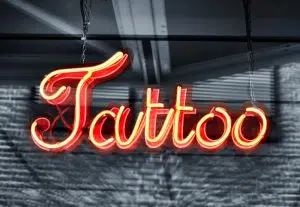
The studio should have a license from the local environmental health officer. This is to ensure that the studio does not pose a risk to public health. Finally, it is important to make sure that the studio has public liability insurance in case of any accidents or injuries.
It may be necessary to obtain planning permission from your local planning authority if you intend to start a new business rather than take over an existing one. You may need planning permission for a home business even if you will be working from a suitably converted room or outbuilding.
Below is a summary of some of the key areas of legislation that may affect your business.
What licences does a tattoo studio need?
The environmental health department of your local authority must register all tattoo artists who offer semi-permanent skin colouring (micropigmentation). A tattoo artist’s premises and their studio must be registered with many local authorities. Your premises will need to be inspected by an officer to ensure that they meet the required standards. Regular inspections may be conducted at your premises. For more information, contact your local environmental health department. If you plan to work in a client’s home from time to time (at their request), ensure that your registration allows you to do so.
It is important to note that you will need clearance from the local authority in each area where you plan to tattoo at events and festivals. If you do not have a properly equipped mobile studio (for example a large, converted van) that you have been able to register as your premises, it may be very difficult to get a licence to do permanent tattoos at events. At these, however, you might be able to get henna tattoos instead, which are non-permanent. Private events such as tattoo parties held in someone’s home are illegal for tattoo artists to provide services.
In most cases, local authorities require cosmetic skin-piercing businesses to register in order to regulate them. It is possible to obtain a single registration or license for cosmetic skin piercings and tattoos. For more information, contact your local authority.
Here are some other things to keep in mind:
- Music Licences from PPL PRS Ltd are usually required if you play background music. The PPL PRS website allows you to pay the annual fee online
- The Information Commissioner’s Office (ICO) may require businesses that keep computerised records of individuals’ personal information to register as data users.
Anaesthetics
Pharmacies and medical practitioners sell lignocaine-based anaesthetic creams and sprays. Body artists without medical training may be violating medicines law if they apply such products. Doctors, dentists, and nurse prescribers may administer anaesthetic products that are injected.
Age limit and other restrictions
Tattooing anyone under the age of 18 is illegal, regardless of their parents’ permission. In most areas of the UK, body piercing has no legal age limit. Under 14-year-olds must be accompanied by a parent or guardian when they have a body piercing performed by members of the British Body Piercing Association (BBPA). A parent or guardian with parental responsibility for an under-16 must accompany them.
Read more: Sector trends for tattoo studios
Registering with your environmental health department
Local environmental health departments must register all tattoo artists and their premises. If you do not have a registration, you cannot do permanent or semi-permanent skin colouring. The certificate of registration should be displayed on your premises.
Inspections are conducted to ensure that the premises and equipment meet the standards required by local byelaws. There may be slight variations between states, but all are concerned with maintaining health and safety by ensuring high standards of cleanliness, hygiene and using appropriate equipment (for example, autoclaves for sterilising). After you have registered, your studio will be regularly inspected to ensure that you remain compliant. Contact your local environmental health department for further details.
In addition, the Chartered Institute of Environmental Health (CIEH) provides environmental health advice.
The Public Health England body piercing and tattooing guidance toolkit is available for download. The document provides detailed guidance on implementing safe working practices in compliance with health and safety legislation. On Gov.uk, you can discover further details.
Copyright
Without permission, you may violate copyright law if you copy an artist’s work. Go to Gov.uk’s Intellectual Property Office (IPO) section to learn more about copyright law.
Waste disposal
It is important to dispose of all waste properly. A tattoo artist’s waste may be classified as clinical or hazardous waste. Needles, spatulas, dressings, and antiseptic wipes are examples of items that might fall into this category. A registered, authorised waste carrier must take away and dispose of such waste. For information about authorised waste carriers in your area, contact your local environmental health department.
Hazardous substances
Control of Substances Hazardous to Health (COSHH) Regulations apply to you and your staff because you may handle potentially hazardous substances. You can get assistance from your local environmental health department.
Health & Safety, fire
It is your responsibility to comply with workplace health and safety and fire safety legislation.
Anyone who uses needles or comes into regular contact with blood products should be immunised against hepatitis B. Additionally, it is recommended that you have an up-to-date tetanus vaccination.
Employment legislation
It is a legal requirement for anyone who employs staff to follow employment legislation. Employment legislation includes recruitment, employment contracts, pay, working hours, holidays, sick leave, parental leave, discrimination, discipline, grievances, dismissals, redundancies, and employment tribunals.
Insurance for a tattoo studio
Explain how your business will operate to an insurer or insurance broker, and they will explain what coverage you need by law, as well as other coverage you may need. The following might be included:
- A description of the premises and its contents
- Cash
- Business interruption
- Employer’s liability
- Public liability
- Professional indemnity/negligence cover
- Loss of registration
- Treatment risk (for injuries or infection occurring as a result of a tattoo/body piercing)
- Motor insurance (for any business vehicle)
In addition to public liability insurance, employers’ liability insurance is also required if you employ employees.
You should inform your insurer if you plan to offer a mobile service and attend events and festivals. It may be difficult for you to obtain public liability insurance – but you should never work without it. Henna (non-permanent) tattoos may be easier to get insured at events.
Find out more about tattoo and piercing business insurance on the UK Tattoo Studio website.
Conclusion
Tattoo parlours face a multitude of legal issues within the UK since tattooing has been regulated since the early 2000s. The scope and complexity of this regulation has grown enormously over the years. Local authorities control the licensing and enforcement of tattoo artists who are required to be registered and follow strict hygiene standards in order to operate legally within the country. Health, safety and environmental regulations must also be adhered to at all times, for safeguarding both customers and employees alike.
Additionally, it is essential that all staff are appropriately trained in order to comply with health regulations and the individual’s cultural sensitivities when carrying out tattoos. Violators may be subject to hefty fines or alternatively have their licence revoked altogether; therefore it is vitally important that tattoo studios properly understand all relevant legal parameters in order to remain compliant with UK law.
Lee Jones is a seasoned Business Finance Specialist with over two decades of invaluable experience in the financial sector. With a keen eye for market trends and a passion for helping businesses thrive, Lee has become a trusted advisor to countless organizations seeking to navigate the complexities of finance.


